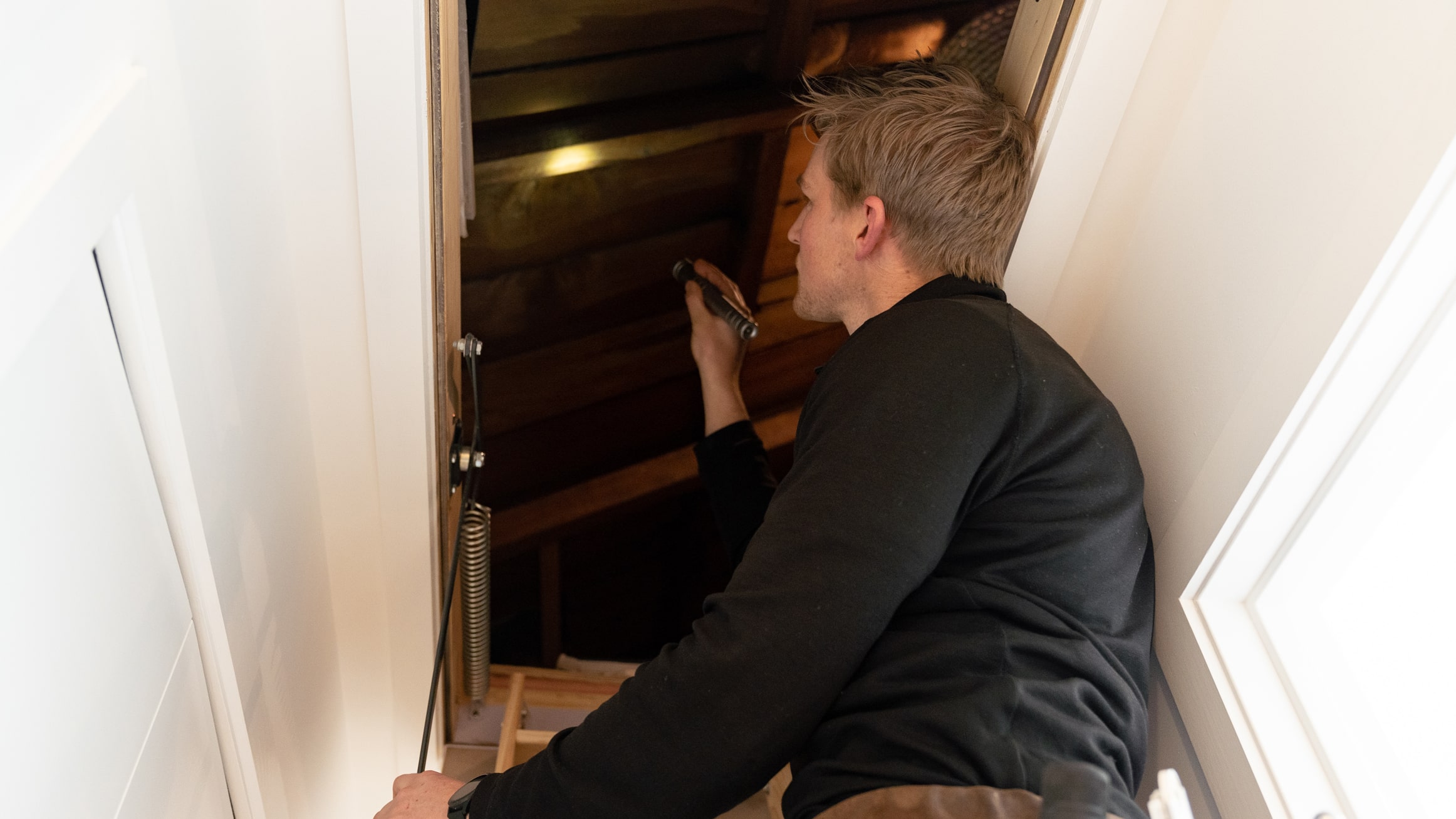Home>Home Maintenance>What Should A Buyer Do When An Inspection Finds Issues?


Home Maintenance
What Should A Buyer Do When An Inspection Finds Issues?
Modified: March 6, 2024
Discover what steps buyers should take when a home inspection uncovers issues. Learn how to handle maintenance woes for a stress-free home buying process.
(Many of the links in this article redirect to a specific reviewed product. Your purchase of these products through affiliate links helps to generate commission for Storables.com, at no extra cost. Learn more)
Introduction
Buying a home is an exciting and fulfilling milestone in anyone’s life. However, it’s essential to approach the home-buying process with caution, ensuring that you make an informed decision before signing on the dotted line. One crucial step in this process is the home inspection.
During a home inspection, a professional inspector thoroughly examines the property to identify any issues or defects that may require attention or repairs. It is common for inspections to uncover issues, ranging from minor maintenance concerns to more significant structural problems.
When an inspection uncovers issues, it can leave home buyers feeling uncertain and unsure of the next steps to take. In this article, we will explore what buyers should do when an inspection finds issues. With the right approach, you can effectively navigate this situation and ensure that you make the best decision for your home purchase.
Understanding the inspection process is crucial, as it sets the context for handling issues. A home inspection typically occurs after a potential buyer has made an initial offer on the property. It involves a professional inspector visiting the home and conducting a thorough evaluation of its condition.
The inspector examines various elements of the property, including but not limited to the foundation, roof, plumbing, electrical systems, HVAC systems, and overall structural integrity. After the inspection is complete, the inspector prepares a detailed report outlining the issues, along with recommendations for repairs or further evaluation by a specialist.
Receiving the inspection report is a significant moment in the home-buying process. When you receive the report, take the time to carefully review it and ensure you understand all the identified issues. It’s essential to read through the report comprehensively and prioritize the identified problems based on their severity and potential impact on the property’s safety and value.
Key Takeaways:
- When buying a home, it’s crucial to carefully review the inspection report, prioritize issues, and consult with professionals for guidance. Negotiating with the seller and considering repair costs are essential steps in making an informed decision.
- If the identified issues pose significant risks or the seller is unwilling to address them, it may be best to walk away from the deal. Prioritizing long-term happiness and financial stability is key in the home-buying process.
Understanding the Inspection Process
Before diving into what to do when an inspection finds issues, it’s crucial to have a good understanding of the inspection process itself. A home inspection is conducted by a professional inspector who assesses the condition of a property, identifying any visible problems or defects that may require attention or repairs.
During the inspection, the inspector will examine the various components of the property, including the foundation, roof, plumbing, electrical systems, HVAC systems, and overall structural integrity. They will look for any issues that could affect the safety, functionality, or value of the home.
It’s important to note that a home inspection is not a warranty or guarantee of the property’s condition. Inspectors can only evaluate what they can see and access. They cannot uncover concealed issues or predict future problems.
Once the inspection is complete, the inspector will provide you with a detailed report summarizing their findings. This report will include a comprehensive list of the issues identified during the inspection, along with any recommendations for repairs or further evaluation by specialists.
It’s essential to review the inspection report thoroughly and ask for clarification on any areas that you don’t understand. If there are any major concerns or questions, consider reaching out to the inspector directly to discuss the findings.
Remember, the primary purpose of a home inspection is to ensure that you have a clear understanding of the property’s condition. It’s an opportunity to identify any significant issues that may impact your decision to proceed with the purchase or negotiate the terms with the seller.
Now that we have a clear understanding of the inspection process, let’s move on to what to do when an inspection finds issues.
Receiving the Inspection Report
After the home inspection is completed, you will receive an inspection report that outlines the issues identified during the process. This report is a crucial document that will serve as your guide on how to proceed.
When you receive the inspection report, take the time to read it thoroughly and familiarize yourself with the findings. The report will typically include a detailed description of each issue, along with supporting photographs and recommendations for repairs.
As you review the report, it’s essential to prioritize the identified issues based on their severity and potential impact. Some issues may be minor cosmetic concerns or routine maintenance items, while others may be more significant structural or safety issues that require immediate attention.
It’s also important to note that not every issue listed in the report may require immediate action. Some items may be negotiable with the seller, while others may be suitable for you to address after the purchase. Use your judgment and consider seeking advice from professionals in the field, such as contractors or real estate agents, to help you assess the significance of each issue.
If you come across any areas of the inspection report that you don’t understand, don’t hesitate to reach out to the inspector for clarification. They will be able to provide further insights and answer any questions you may have.
Remember, the inspection report is meant to be a comprehensive overview of the property’s condition. It’s crucial to take the time to review it thoroughly and consult with professionals if needed. This will help you make informed decisions about how to proceed with the home purchase.
Now that you have received the inspection report and have a clear understanding of the identified issues, let’s move on to the next step: prioritizing the issues and deciding how to address them.
Prioritizing the Identified Issues
Once you have received the inspection report and familiarized yourself with the identified issues, it’s time to prioritize them. Not all issues carry the same level of urgency or impact on the property’s safety and value, so it’s important to assess each item carefully.
Start by identifying any major issues that require immediate attention. These could include structural concerns, electrical problems, plumbing leaks, or safety hazards. Addressing these issues should be your top priority as they pose potential risks and may significantly impact the habitability and value of the home.
Next, consider the medium-level issues. These may include roof repairs, HVAC system maintenance, or other non-urgent but necessary repairs. While not as critical as the major issues, addressing these items will contribute to the overall functionality and longevity of the property.
Lastly, look at the minor issues listed in the inspection report. These could involve cosmetic repairs, minor maintenance tasks, or general wear and tear. While these issues may not be high-priority, it’s still essential to address them as they can affect the overall appearance and condition of the home.
Consider consulting with professionals such as contractors, real estate agents, or home inspectors to help you evaluate the significance of each issue and provide guidance on prioritization. They can provide insights based on their expertise and experience, helping you make informed decisions.
It’s important to remember that prioritization may also depend on your budget and timeline. Assess the potential costs and the time it will take to address each issue, and determine if they align with your resources and desired move-in date.
Once you have prioritized the identified issues, you can proceed to the next step: consulting with the home inspector for further clarification and insights.
Consulting with the Home Inspector
After reviewing the inspection report and prioritizing the identified issues, it’s beneficial to reach out to the home inspector for further clarification and guidance. The inspector is a valuable resource who can provide insights into the severity of the issues and offer recommendations for the necessary repairs.
When consulting with the home inspector, prepare a list of questions or concerns based on the inspection report. Take note of any items that require further explanation or require additional insights. This will help ensure that you cover all relevant areas during the consultation.
During the consultation, ask the inspector to explain the specific details of each issue, including the potential causes, immediate risks, recommended repairs, and associated costs. Understanding the scope and impact of the issues will aid in making informed decisions about how to proceed.
Additionally, the home inspector may be able to provide guidance on whether the identified issues are common for properties of a similar age and type. This can give you an idea of whether the repairs are typical or if they indicate a more significant underlying problem.
Keep in mind that the home inspector’s role is to provide an objective evaluation of the property’s condition. They may not have specific expertise in every area identified in the inspection report. If necessary, the inspector may refer you to specialized professionals, such as electricians, plumbers, or contractors, for further evaluation of certain issues.
Take thorough notes during the consultation to ensure that you capture all the important details and recommendations provided by the inspector. This will help you make informed decisions and communicate effectively with other professionals or the seller.
Remember, consulting with the home inspector is essential to gain a deeper understanding of the identified issues. Their insights and recommendations can guide you in determining the best course of action for addressing the problems and negotiating with the seller, which we will discuss in the next section.
Seeking Professional Advice
When an inspection uncovers issues with a home, it’s often wise to seek professional advice from experts in the relevant fields. These professionals can provide specialized knowledge and help you make well-informed decisions regarding the identified issues.
Depending on the nature of the issues discovered during the inspection, you may want to consult with professionals such as contractors, structural engineers, electricians, plumbers, or HVAC specialists. These experts can provide a more in-depth evaluation of specific problems and offer recommendations for repairs or further assessments.
It’s important to choose professionals with reputable credentials and experience in the specific areas of concern. Look for individuals or companies with a proven track record and positive reviews from past clients.
When consulting with professionals, provide them with a copy of the inspection report and any additional relevant information. This will ensure they have a comprehensive understanding of the property’s condition and can offer accurate assessments and advice.
During your discussions with these experts, ask questions about the severity of the issues, the potential risks involved, the estimated costs of repairs, and any associated timelines. This information will help you weigh the impact of the issues on the overall value and livability of the home.
Seeking professional advice serves two main purposes. Firstly, it allows you to validate the findings of the inspection and ensure that you have an accurate understanding of the issues at hand. Secondly, it provides you with the support and expertise needed to make sound decisions regarding the necessary repairs or negotiations with the seller.
Remember, professional advice should be sought as a supplement to the home inspection report and consultation with the home inspector. The goal is to gather as much information as possible to make an informed decision about how to proceed with the property purchase.
Now that you have sought professional advice and gathered expert opinions on the identified issues, it’s time to move on to the next step: negotiating with the seller.
Before closing the deal, negotiate repairs or a lower price to account for the issues found during the inspection. Always consult with a real estate professional for guidance.
Negotiating with the Seller
When an inspection reveals issues with the property you are interested in purchasing, it is typically time to enter into negotiations with the seller. Negotiating with the seller can provide an opportunity to address the identified issues and reach a resolution that satisfies both parties.
Before entering into negotiations, gather all the information you have collected, including the inspection report, professional assessments, and cost estimates for repairs. This information will provide you with a strong basis for your negotiations.
Start by determining which issues you believe are reasonable to request the seller to address. Focus on the major issues that pose significant risks or impact the property’s functionality. These are the issues that can make or break the deal and may require the seller’s immediate attention.
When approaching the seller, be clear and specific about the issues you would like them to address. Use the information from the inspection report and professional assessments as supporting evidence to justify your requests. Provide them with a copy of the inspection report and any relevant documentation to support your claims.
Remember, negotiations are a two-way process. Be willing to listen to the seller’s perspective and consider their counteroffers. They may be willing to address certain issues or offer alternative solutions that can accommodate both parties’ needs.
Consider seeking guidance from your real estate agent or attorney during the negotiation process. These professionals can provide valuable advice and help you navigate through the negotiation process successfully.
It’s essential to approach negotiations with a cooperative mindset. Remember that both you and the seller share a common goal of completing the sale. By maintaining open communication and a willingness to find mutually beneficial solutions, you can increase the chances of reaching a satisfactory agreement.
If negotiations fail to result in a resolution that meets your needs, you may need to consider alternative options such as requesting repairs or credits, or even reconsidering your purchase offer altogether. We will explore these options further in the following sections.
Now that we have discussed negotiating with the seller, let’s move on to the next step: requesting repairs or credits.
Requesting Repairs or Credits
When an inspection uncovers issues with a property, one option you have as a buyer is to request repairs or credits from the seller. This allows you to address the identified issues while still moving forward with the purchase. Here’s what you need to know about requesting repairs or credits.
Start by compiling a list of the issues you would like the seller to address. Focus on the major issues that directly impact the safety, functionality, or value of the home. These are the issues that should take priority in your request.
Once you have your list, work with your real estate agent or attorney to draft a formal request for repairs or credits. Be clear and specific in outlining each issue and the desired resolution. Use the information from the inspection report, professional assessments, and cost estimates to support your request and justify the need for repairs or credits.
When making the request, it’s important to strike a balance between being firm in your position and remaining open to negotiations. Understand that the seller may not agree to address all the requested issues or may propose alternative solutions. Be prepared to negotiate and come to a compromise that is acceptable to both parties.
If the seller agrees to proceed with repairs, establish a timeline for completion and specify the qualifications and certifications required for the professionals performing the repairs. It’s important to ensure that the repairs are done before the closing date to avoid any last-minute complications.
If the seller agrees to provide credits instead of making repairs, clearly specify the amount of the credits and how they will be applied in the transaction. Keep in mind that credits may be a more flexible option, allowing you to address the issues on your terms after the purchase.
If the seller refuses to address the issues or come to a satisfactory agreement, you have the option to reconsider your purchase offer. Depending on the severity of the issues and your level of comfort, it may be in your best interest to walk away from the deal.
Remember to consult with your real estate agent, attorney, or other professionals throughout the process to ensure that your rights and interests are protected. Their guidance and expertise can help you navigate the negotiation process and make informed decisions.
Now that we have explored the option of requesting repairs or credits, let’s move on to the final step: considering whether to proceed with the purchase or walk away from the deal.
Reconsidering the Purchase Offer
When an inspection uncovers significant issues with a property, you may need to reconsider your purchase offer. This can be a difficult decision, but it’s important to prioritize your long-term happiness and financial well-being. Here are key considerations when reassessing your purchase offer:
Evaluate the severity of the issues: Assess the severity of the identified issues and determine the potential impact on the property’s safety, functionality, and value. Some issues may be relatively minor and manageable, while others may require extensive repairs and significantly affect the property’s livability and resale potential.
Consider the cost of repairs: Calculate the estimated cost of repairs for the identified issues. If the expenses exceed your budget or if there are additional hidden costs that may arise, it might be a red flag. Compare the cost of repairs to the overall value of the property to determine if it’s worth proceeding with the purchase.
Assess your tolerance for risk: Evaluate your risk tolerance and consider whether you are willing and financially able to invest in a property with significant issues. Some buyers may be comfortable taking on the necessary repairs and renovations, while others prefer properties that require less immediate attention.
Consult with professionals: Seek advice from professionals such as real estate agents, attorneys, and contractors, who can provide objective insights based on their expertise. They can help you assess the situation, understand the potential implications, and make an informed decision.
Review your contingencies: Review the contingencies specified in your purchase offer, such as the financing contingency and inspection contingency. These contingencies provide you with protection and allow you to back out of the deal if certain conditions are not met. Understand the terms and timelines associated with these contingencies and consult with your real estate agent or attorney to navigate them properly.
Consider the impact on your future plans: Think about your long-term plans for the property. If the identified issues will prevent you from achieving your desired use or future goals, it might be wise to walk away from the deal.
Negotiate further if necessary: If you still have concerns but are not ready to walk away, you can attempt to negotiate with the seller further. Present your findings, concerns, and proposed solutions, and see if an agreement can be reached that satisfies both parties. Be prepared, however, for the possibility of the seller refusing to make further concessions.
Ultimately, the decision to reconsider your purchase offer depends on your comfort level, financial situation, and the extent of the identified issues. It’s important to prioritize your happiness and well-being, even if it means walking away from a deal.
Now that we’ve discussed the process of reconsidering the purchase offer, let’s move on to the final step: deciding whether to walk away from the deal or proceed with the purchase.
Walking Away From the Deal
After careful consideration and evaluation of the identified issues, you may find yourself in a situation where walking away from the deal is the best course of action. It’s essential to trust your instincts and prioritize your long-term satisfaction and financial well-being. Here are key reasons and steps to take when deciding to walk away:
Unmanageable repair costs: If the estimated costs of repairing the identified issues exceed your budget or are more than what you are comfortable investing in the property, walking away may be the prudent choice. It’s important to be realistic about your financial capabilities and avoid taking on a property that could lead to excessive financial strain.
Major structural or safety concerns: Issues that affect the structural integrity or pose safety hazards can be significant red flags. If these issues are beyond your comfort level and the seller is unwilling to address them, it may be wise to walk away to protect yourself from potential future problems and expenses.
Other undisclosed or lingering concerns: During the inspection and subsequent assessments, if other undisclosed or lingering concerns arise, it can indicate a lack of transparency or potential hidden issues with the property. These unknowns can greatly impact your future satisfaction as a homeowner and should be taken into consideration when making the decision to walk away.
Inability to negotiate a satisfactory resolution: If negotiations with the seller have reached an impasse, and you are unable to reach a satisfactory resolution regarding the identified issues, it may be an indication that the seller is not willing to address your concerns. In such cases, it’s better to walk away rather than entering into a transaction that leaves you dissatisfied or burdened with unresolved issues.
Remember to consult with your real estate agent or attorney throughout the process. They can guide you through the necessary steps to formally withdraw your offer and ensure that any earnest money or contingencies are handled appropriately in accordance with the terms of the contract.
While walking away from a deal can be disappointing, it’s essential to prioritize your long-term happiness and financial stability. By being diligent and making informed decisions, you can protect yourself from potential problems and find a better-suited property in the future.
Now that we have covered the steps involved in walking away from the deal, it’s time to reflect on the overall process and the importance of thorough inspections and evaluations in the home-buying journey.
Conclusion
The process of buying a home comes with its fair share of excitement and challenges. When an inspection finds issues, it can feel overwhelming and uncertain. However, by approaching the situation with knowledge and careful consideration, you can navigate these challenges and make informed decisions.
Understanding the inspection process and receiving the inspection report are critical first steps. Take the time to review the report thoroughly, prioritize the identified issues, and consult with the home inspector for further insights and clarification.
Seeking professional advice from experts in relevant fields can provide valuable opinions and recommendations to guide your decision-making process. Additionally, negotiating with the seller allows you to address the identified issues through repairs or credits that are mutually acceptable.
If the negotiation process fails to yield a satisfactory resolution, it may be necessary to reconsider your purchase offer. Assess the severity of the issues, evaluate the cost of repairs, and consult with professionals to determine if proceeding with the purchase is in your best interest.
Ultimately, if the identified issues pose significant risks or the seller is unwilling to address them, walking away from the deal may be the most prudent choice. Prioritizing your long-term happiness, financial stability, and future plans should always be at the forefront of your decision-making process.
Remember, thorough inspections and evaluations play a vital role in the home-buying journey. They provide important insights into the condition of the property and allow you to make informed decisions about your investment.
Buying a home is a significant decision, and it’s important to proceed with caution and due diligence throughout the process. By understanding the inspection process, effectively handling the identified issues, and making informed decisions, you can navigate through the challenges and find a home that meets your needs and brings you joy for years to come.
Frequently Asked Questions about What Should A Buyer Do When An Inspection Finds Issues?
Was this page helpful?
At Storables.com, we guarantee accurate and reliable information. Our content, validated by Expert Board Contributors, is crafted following stringent Editorial Policies. We're committed to providing you with well-researched, expert-backed insights for all your informational needs.














0 thoughts on “What Should A Buyer Do When An Inspection Finds Issues?”